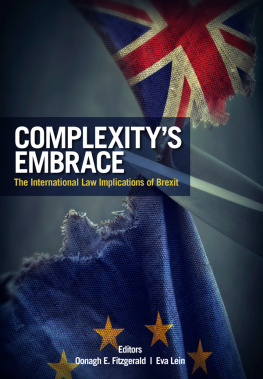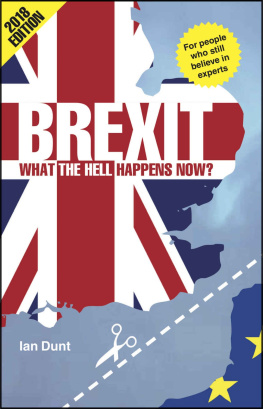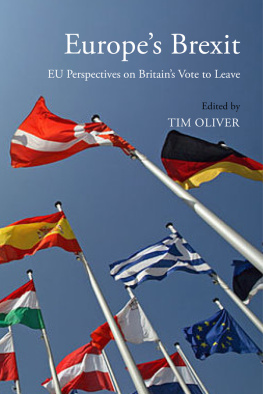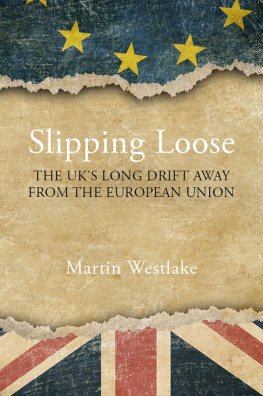COMPLEXITYS EMBRACE

COMPLEXITYS EMBRACE
The International Law Implications of Brexit
Editors
Oonagh E. Fitzgerald | Eva Lein
2018 Centre for International Governance Innovation
ALL RIGHTS RESERVED. No part of this publication may be reproduced, stored in a retrieval system or transmitted by any means, electronic, mechanical, photocopying, recording or otherwise, without the prior written permission of the publisher, application for which should be addressed to the Centre for International Governance Innovation, 67 Erb Street West, Waterloo, Ontario, Canada N2L 6C2 or .
ISBN 978-1-928096-62-7 (cloth)
ISBN 978-1-928096-63-4 (paper)
ISBN 978-1-928096-64-1 (ePUB)
ISBN 978-1-928096-65-8 (ePDF)
Library and Archives Canada Cataloguing in Publication
Complexitys Embrace: The International Law Implications of Brexit / edited by Oonagh E. Fitzgerald and Eva Lein
Includes bibliographical references.
Issued in print and electronic formats.
ISBN 978-1-928096-62-7 (cloth).--ISBN 978-1-928096-63-4 (paper).-
ISBN 978-1-928096-64-1 (ePUB).--ISBN 978-1-928096-65-8 (ePDF)
1. European Union--Great Britain. 2. International and municipal law--Great Britain. 3. Commercial law--Great Britain. 4. Commercial law--European Union countries. 5. Civil law-Great Britain. 6. Civil law--European Union countries. 7. Environmental law--Great Britain. 8. Environmental law--European Union countries. I. Fitzgerald, Oonagh E., 1955-, editor II. Lein, Eva, editor III. British Institute of International and Comparative Law, issuing body IV. Centre for International Governance Innovation, issuing body
KD4015.C66 2018 | 342.41 | C2018-901020-7 |
C2018-901021-5 |
The opinions expressed in this publication are those of the authors and do not necessarily reflect the views of the Centre for International Governance Innovation or its Board of Directors.
Published by the Centre for International Governance Innovation (CIGI) in partnership with the British Institute of International and Comparative Law (BIICL).
Printed and bound in Canada on 100 percent post-consumer recycled paper (FSC).

Cover and page design by Melodie Wakefield.
Centre for International Governance Innovation and CIGI are registered trademarks.

| 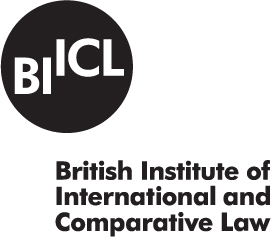
|
Centre for International Governance Innovation | British Institute of International and Comparative Law |
67 Erb Street West | Charles Clore House, 17 Russell Square |
Waterloo, ON Canada N2L 6C2 | London, WC1B 5JP, UK |
www.cigionline.org | www.biicl.org |
Foreword
Diana Wallis
As human beings, we tend to look for the way forward and to seek progression, yet despite the recent warm words of the UK foreign minister, it is hard to see the UK decision to leave the European Union in positive, progressive terms. However it is viewed, it involves undoing, repealing and re-enacting, and even the famous taking back control slogan in this sense has a regressive tone. All this, as elegantly put in the introduction to this volume, is counterintuitive to most international lawyers, who have seen our role as enablers of greater and simpler interaction and integration in an increasingly interconnected world. Suddenly we are asked to contemplate full reverse gear, but without any clear vision of what we are attempting to reach or, to put it positively, what is the nature of this new international order and, most particularly, the British place in it.
Sometimes images help. I will always recall, as a member of the European Parliament, a meeting with a senior US official from the Clinton administration. After we had finished our business, she was keen to see the Parliament and the plenary chamber. So off we went. As she entered the door and saw all the members seats and the flags, she turned toward me and this very tough lady had tears in her eyes. The sight caught her off balance and she said, Its like when I was a child, how I imagined a world Parliament! Perhaps we British, at least, do not appreciate what we have created.
So how to dismantle, or rather disentangle, the United Kingdom from decades of closer legal engagement with our continental neighbours? For those of us who have been daily hoping for a vision or road map of future possibilities from the British government, this volume provides an excellent discussion of possibilities and, of course, the various difficulties they will entrain. It is helpful to examine in detail several sectors of law such as environmental or intellectual property rights. Of course, we all have our favourite subjects, but the problem with Brexit is that it seeps into every legal and regulatory activity where unknown consequences surface. It is hard to visualize the whole, which is probably partly why discussions revert to simplistic reliance on arguments about sovereignty, which take us no further toward a vision of the future.
Personally, I always expected that the UK government would formulate some sort of Switzerland-light vision, in which the country keeps its internal democracy intact, freed from the Court of Justice of the European Union and attempts to establish an extensive set of bilaterals on key issues or sectors. Of course, the European Commission would hate it and it would be tough, but at least it would be some sort of substantial template. Instead, we seem to be veering toward a complete third-country relationship. In this respect, the thoughts from Canada within this volume are illuminating, both on dealing with referenda and coming to terms with a new order in international trade. However, in Canada, there appears to have been more reflection and coming together through society at large, which currently remains starkly absent in the UK debate. The implications of this debate, or rather divide, in Northern Ireland and Scotland threaten the very foundations of the United Kingdom.
Perhaps we were lulled into a false sense of security. I would have tended to characterize the British view of the European Union as akin to our relationship with the weather: something we talk and complain about endlessly, but ultimately just get on with. I did not imagine that my compatriots would get themselves into such a situation and then, some 18 months after making the decision, still lack a clear view of where we are heading. This volume will assist those who search for possible answers and outcomes. It may not be the old linear progress we assumed, but whatever else, Brexit (and US President Donald Trump) are ushering in a new and very dynamic era for international lawyers and law.
Acknowledgements
We are most grateful to the authors who contributed chapters to this book. We also thank former BIICL Director Robert McCorquodale, former ILRP Deputy Director Markus Gehring, and CIGI and BIICLs events team for their engagement in making the 2017 conference a success. We thank especially Susan Bubak, Sharon McCartney and Carol Bonnett from the CIGI publications team for their highly professional advice and meticulous editing, as well as Melodie Wakefield from the CIGI design team for her stylish layout of the series and book. We are indebted to Maziar Peihani and Nethmi Kulatilake for their careful work in helping to keep us on schedule and managing the peer review process. We acknowledge the helpful assistance of CIGI Counsel Sam Anissimov and Program Manager Scott Lewis in developing the publication partnership and the contributors contracts. We thank the communications teams at CIGI and BIICL for their support in promoting the series and book through strategic placement of op-eds and commentaries by contributing authors.

